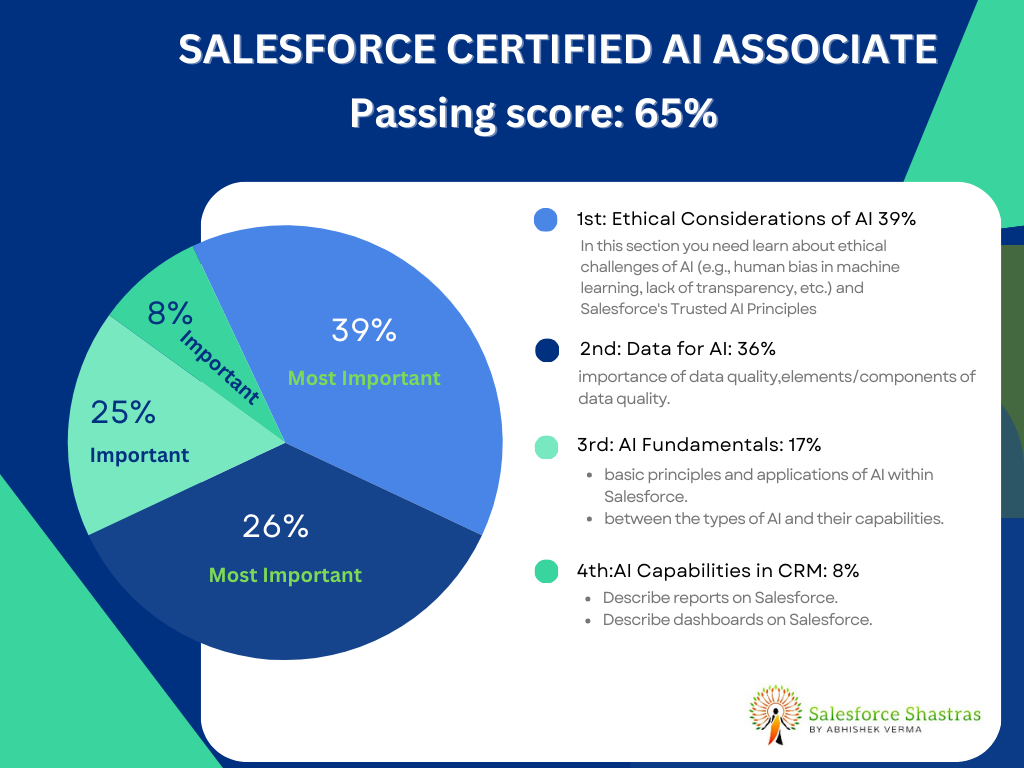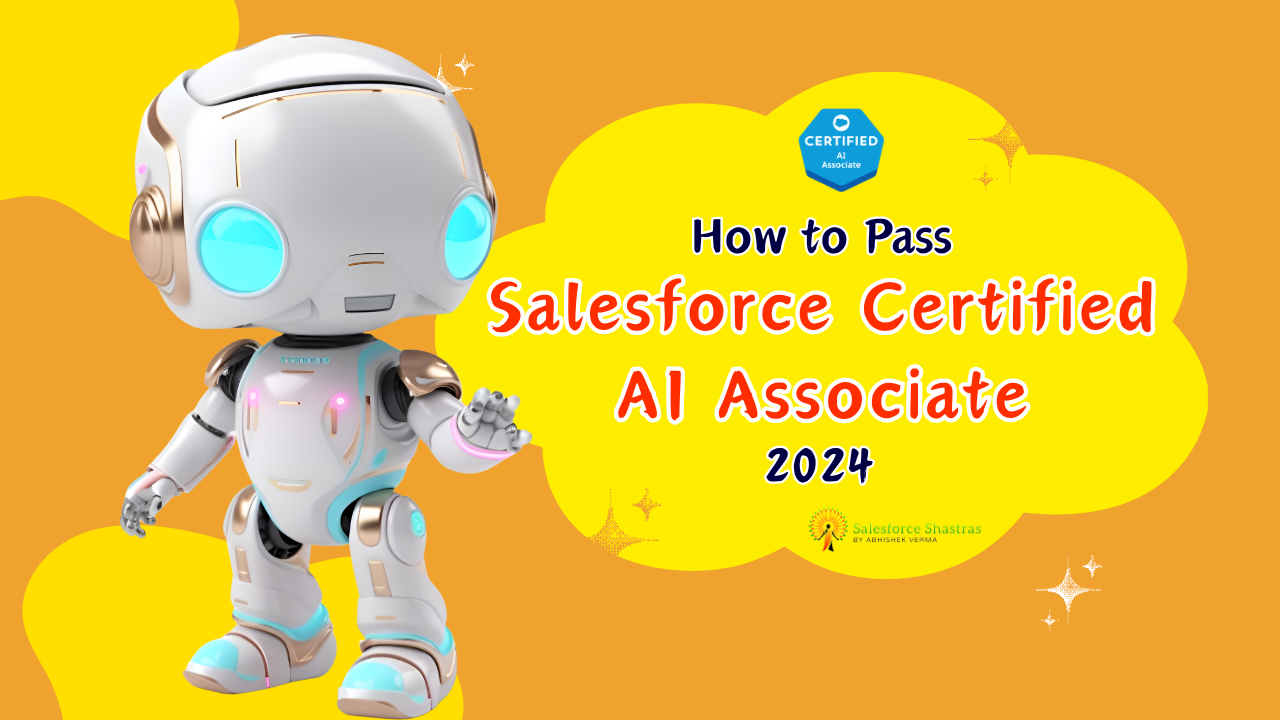Introduction
The Salesforce Certified AI Associate exam equips you with the knowledge and skills to provide informed strategies and guide stakeholder decisions based on Salesforce’s Trusted AI Principles. As you prepare, keep these essential points in mind:
- Exam Details:
- Content: 40 multiple-choice questions
- Time Allotted: 70 minutes
- Passing Score: 65% (26 out of 40 questions)
- Exam Fee: USD 75 plus applicable taxes
- Prerequisite: None
Exam Outline
Let’s break down the key topics covered in the exam:

1. AI Fundamentals (17%)
- Understand the basic principles and applications of AI within Salesforce.
- Differentiate between types of AI and their capabilities.
- Key components: neural networks, deep learning, natural language understanding (NLU), natural language processing (NLP), and named entity recognition (NER).
Understanding AI Fundamentals
- Core Concepts of AI:
- AI (Artificial Intelligence) refers to the ability of machines or software to perform tasks that typically require human intelligence. It encompasses various techniques, algorithms, and models.
- Key components of AI include neural networks, deep learning, natural language processing (NLP), and more.
- Types of AI:
- Narrow AI (Weak AI): Specialized in specific tasks (e.g., image recognition, chatbots).
- General AI (Strong AI): Possesses human-like cognitive abilities across various domains (still theoretical).
- Machine Learning (ML): Subset of AI where algorithms learn from data and improve over time.
- Deep Learning: A type of ML using neural networks with multiple layers (deep architectures).
- AI Applications in Salesforce:
- Einstein AI: Salesforce’s suite of AI capabilities integrated into its CRM platform.
- Predictive Analytics: Using historical data to predict future outcomes (e.g., lead scoring, sales forecasting).
- Natural Language Processing (NLP): Understanding and generating human language (e.g., chatbots, sentiment analysis).
- Recommendation Engines: Suggesting relevant content or products based on user behavior.
- Image Recognition: Identifying objects or patterns in images (e.g., recognizing product logos).
Differentiating AI Capabilities
- Number Predictions:
- AI models predict numerical values (e.g., revenue forecasts, customer lifetime value).
- Classifications:
- Categorizing data into predefined classes or labels (e.g., spam vs. not spam, customer segments).
- Robotic Navigations:
- AI-driven navigation systems (e.g., autonomous vehicles, drones).
- Language Processing:
- Understanding and generating human language (chatbots, virtual assistants).
Sample Questions:
- What are the key components of neural networks, and how do they contribute to AI models?
- Answer: Neural networks consist of layers (input, hidden, and output) connected by weights. Activation functions introduce non-linearity. These components enable neural networks to learn complex patterns from data.
- Differentiate between deep learning and traditional machine learning algorithms.
- Answer: Deep learning involves neural networks with multiple hidden layers, allowing them to learn hierarchical features. Traditional ML uses simpler models (e.g., linear regression, decision trees) without deep architectures.
- Explain the concept of natural language understanding (NLU) and its relevance in AI applications.
- Answer: NLU enables AI systems to comprehend and interpret human language. It’s crucial for chatbots, sentiment analysis, and language translation.
- What is transfer learning, and how can it be applied in AI models?
- Answer: Transfer learning involves using pre-trained models (e.g., BERT, ResNet) and fine-tuning them on specific tasks. It accelerates model training and improves performance with limited data.
- Describe overfitting and underfitting in machine learning. How can you mitigate these issues?
- Answer: Overfitting occurs when a model learns noise instead of patterns. Underfitting results in poor performance. Regularization techniques (e.g., dropout, L2 regularization) help mitigate these problems.
- What is the curse of dimensionality, and how does it impact machine learning algorithms?
- Answer: The curse of dimensionality refers to the challenges posed by high-dimensional data. It leads to sparsity, increased computational complexity, and the need for dimensionality reduction techniques (e.g., PCA).
2. AI Capabilities in CRM (8%)
- Identify CRM AI capabilities.
- Describe the benefits of AI as they apply to CRM.
Understanding AI Capabilities in CRM
- What is CRM?
- Customer Relationship Management (CRM) refers to the practices, strategies, and technologies that companies use to manage and analyze customer interactions throughout the customer lifecycle. It aims to improve customer relationships, enhance sales, and drive business growth.
- AI Capabilities in CRM:
- Salesforce, as a leading CRM platform, integrates AI capabilities to enhance user experience and drive better business outcomes.
- Here are some key AI capabilities within Salesforce CRM: a. Einstein AI:
- Salesforce’s suite of AI features, including predictive analytics, natural language processing, and recommendation engines.
- Enhances sales, marketing, and service processes by providing intelligent insights and automating tasks.
- AI analyzes historical data to predict lead quality.
- Scores leads based on behavior, demographics, and engagement.
- AI-powered chatbots handle routine customer queries.
- Improve response time and enhance customer support.
- AI recommends personalized content, products, or services to users.
- Increases engagement and conversion rates.
- AI identifies customers at risk of churning (leaving).
- Allows proactive retention strategies.
- AI analyzes customer feedback (reviews, social media) to gauge sentiment.
- Helps improve products and services.
- Benefits of AI in CRM:
- Efficiency: Automates repetitive tasks, allowing sales and service teams to focus on high-value activities.
- Insights: AI-driven analytics provide actionable insights for better decision-making.
- Personalization: Tailors interactions based on individual preferences.
- Predictive Capabilities: Forecasts trends, customer behavior, and sales opportunities.
Sample Questions:
- How can AI enhance customer relationship management (CRM)?
- Answer: AI can automate lead scoring, personalize marketing campaigns, predict customer churn, and provide intelligent recommendations to sales teams.
- Provide examples of AI capabilities that improve sales forecasting and lead scoring.
- Answer: AI analyzes historical data to predict future sales, identifies high-potential leads, and assigns scores based on lead behavior and demographics.
- Describe how AI-driven chatbots can enhance customer support within a CRM system.
- Answer: Chatbots handle routine queries, provide instant responses, and escalate complex issues to human agents. They improve response time and customer satisfaction.
- What is sentiment analysis, and how can it be useful in CRM applications?
- Answer: Sentiment analysis determines the emotional tone of text (positive, negative, neutral). In CRM, it helps gauge customer satisfaction, identify trends, and personalize interactions.
- Explain the concept of recommendation engines in CRM.
- Answer: Recommendation engines suggest relevant products or content to users based on their preferences, browsing history, and behavior. They enhance cross-selling and upselling.
3. Ethical Considerations of AI (39%)
- Address ethical challenges (e.g., human bias, lack of transparency).
- Apply Salesforce’s Trusted AI Principles to scenarios.
Understanding Ethical Challenges in AI
- Bias and Fairness:
- AI systems can inherit biases from training data, leading to discriminatory outcomes.
- Mitigation involves diverse training data, bias-aware algorithms, and regular audits.
- Privacy and Data Protection:
- AI processes personal data, raising privacy concerns.
- Compliance with data protection regulations (e.g., GDPR) is crucial.
- Transparency and Explainability:
- AI decisions should be transparent and explainable.
- Black-box models can be problematic; interpretability is essential.
Salesforce’s Trusted AI Principles
Salesforce emphasizes ethical AI through its Trusted AI Principles:
- Empowerment: AI should empower users and enhance their capabilities.
- Fairness: AI systems must treat all individuals fairly and avoid discrimination.
- Privacy: Respect user privacy and protect sensitive data.
- Transparency: Provide clear explanations for AI decisions.
- Accountability: Ensure responsible use of AI and address any issues promptly.
Sample Questions:
- What is the significance of addressing human bias in AI models, and how can it be mitigated?
- Answer: Bias can lead to unfair decisions. Mitigation involves diverse training data, bias-aware algorithms, and regular audits.
- Apply Salesforce’s Trusted AI Principles to a scenario involving customer data privacy.
- Answer: Ensure transparency, fairness, and accountability when using AI to process customer data. Obtain informed consent and protect privacy.
- Discuss transparency and fairness in AI decision-making.
- Answer: Transparent AI models provide explanations for their decisions. Fairness involves avoiding discrimination based on protected attributes (e.g., race, gender).
- What are the ethical implications of using AI in healthcare?
- Answer: Ethical considerations include patient privacy, bias in diagnostic algorithms, and ensuring AI benefits all patients equitably.
4. Data for AI (36%)
- Emphasize data quality.
- Understand data quality elements/components.
Understanding Data for AI
- Importance of Data Quality:
- Data quality is crucial for successful AI implementation.
- High-quality data ensures accurate model training and reliable predictions.
- Garbage in, garbage out (GIGO) applies to AI—flawed data leads to flawed results.
- Elements of Data Quality:
- Accuracy: Data should be precise and error-free.
- Completeness: All necessary data points should be available.
- Consistency: Data should be uniform across sources.
- Timeliness: Data should be up-to-date.
- Relevance: Data should be relevant to the problem at hand.
- Data Leakage:
- Data leakage occurs when information from the future (not available during model training) influences predictions.
- Prevent leakage by ensuring that features used for prediction are based only on past data.
- Ethical Considerations:
- Dirty or biased data can lead to unethical AI outcomes.
- Responsible AI practices involve addressing bias, ensuring fairness, and protecting privacy.
Sample Questions:
- Why is data quality crucial for successful AI implementation?
- Answer: High-quality data ensures accurate model training and reliable predictions. Garbage in, garbage out (GIGO) applies to AI.
- Identify common data quality issues and propose solutions.
- Answer: Issues include missing values, outliers, and inconsistent formats. Solutions involve data cleaning, imputation, and normalization.
- Explain the role of feature engineering in preparing data for AI models.
- Answer: Feature engineering involves creating relevant features from raw data. It impacts model performance and helps capture underlying patterns.

Study Resources
To prepare effectively, consider the following resources:
- Trailmix: Explore the Salesforce AI Associate Trailmix on Trailhead.
- Practice Exams:
Key Takeaways
Remember, mastering the fundamentals, understanding AI ethics, and focusing on data quality are crucial for success. Good luck on your certification journey! 🌟


